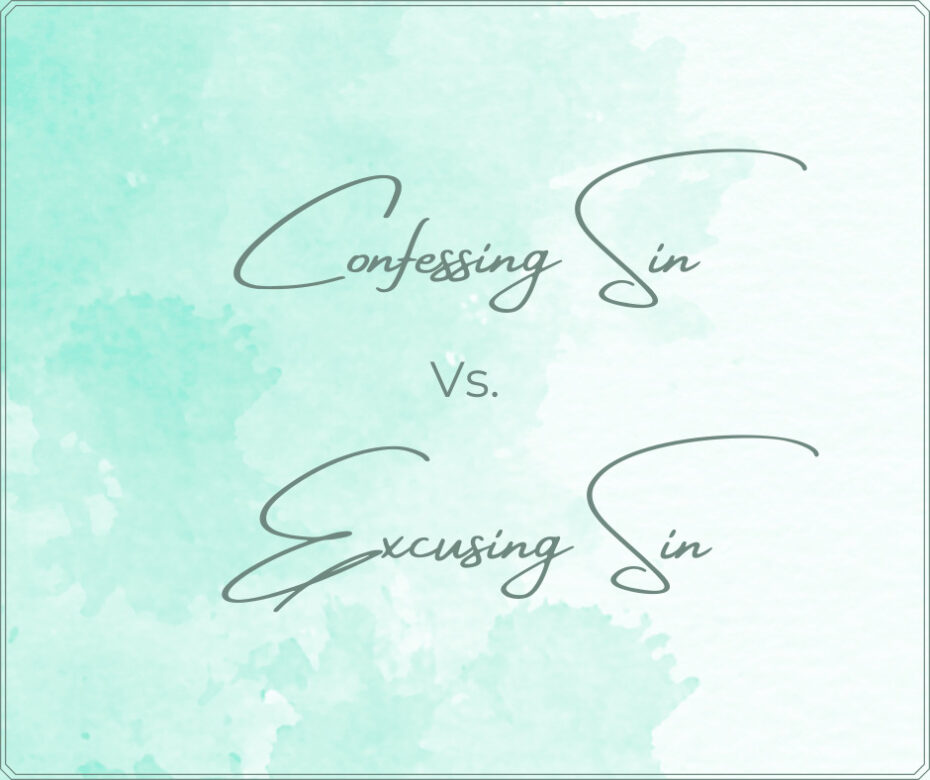Family life—at least our family life—involves a lot of confession.
Certainly, my wife and I confess our sins to each other (and I seem to have to do that more frequently than her).
I also regularly confess when I’ve done something wrong to the kids—usually blowing my top and yelling. I ask them to forgive me (and they usually do!).
Naturally, we’re also trying to teach that, instead of apologizing only when they’ve been caught, they should confess their sins to us and to each other because that’s the right thing to do.
However, instead of a confession, what most often happens is that we get excuses. Lots of excuses.
“But she hit me first!”
“Well, he jumped on me!”
“But he took my book!”
“She called me a bonehead!”
“But she wouldn’t let me play with the cat!”
Do you ever find yourself making excuses for your sins to God?
You wronged someone. You acted out in anger, lied to them, went behind their back, or otherwise hurt them, and instead of going and apologizing, you rationalized your actions and tried to figure out why you were justified in doing what you did.
If so, watch out.
Miles Stanford says that a believer can drift spiritually so that “the indwelling principle of sin once more asserts its tyrannical power.” And when that begins to happen, certain things typically follow:
Peace and love tend to weaken and drain away. The “quiet time” quietly dies. Study of the Word becomes burdensome work. The conscience is defiled; sins are no longer confessed, but excused… (Stanford, Green Letters, pp. 125-26, emphasis added).
That line—“sins are no longer confessed, but excused”—jumped out at me. I was reading an otherwise excellent book about why Christianity makes emotional sense when, in the second to last chapter, the author very nearly ruined the whole effort by arguing the church should eventually get around to accepting homosexuality and gay marriage. It should do that because of love and grace. “We are not supposed to be assigning guilt according to who does what with whom,” the author said. “Categories of clean and dirty belong in the law-religions, not in Christianity.”
If the author meant that Christianity has no moral standards and doesn’t judge some thoughts and actions as sin and others as good, he is gravely wrong. For example, there is no question that the NT considers homosexuality a sin. Any other position either rejects the text or is disingenuous with it. It is no wonder the denominations that have come to approve of homosexuality are precisely those with the lowest views of Scripture.
I have found a flawed type of teaching that runs under the “grace” label that commits the error of thinking being graceful means refusing to call something a sin. (The authors are typically Anglican.) Indeed, it often redefines sin to be a virtue. For example, according to these preachers, showing “grace” to homosexuals means telling them that their behavior is perfectly acceptable to God, and it’s the disapproving “bigots” who are in the wrong.
The problem with that position is that God’s unmerited favor—His grace—assumes there is such a thing as merit and demerit. It presupposes that you can act in ways that can either gain God’s favor or deserve His displeasure. The good news of God’s unmerited favor is that, even though you are a sinner who deserves His wrath, He has decided to show you favor anyways. That’s authentic good news to sinners, including those who struggle with sexual sins. Your sins—and they are sins—are not a barrier to your salvation because God has chosen to save you through faith in Jesus, apart from your works (Eph 2:8-9).
(There is an opposite error where someone thinks that being “tough on sin” means adding works such as repenting from sexual sins to the condition of salvation. That’s a different form of false “grace.”)
If something is a sin, grace people should call it what it is. And when we realize that we’ve sinned, we should confess it—whether to God (1 John 1:9) or each other (Jas 5:16).
Meanwhile, be aware there is a type of “grace” teaching that excuses sin instead of confessing it. And there’s no excusing that.


